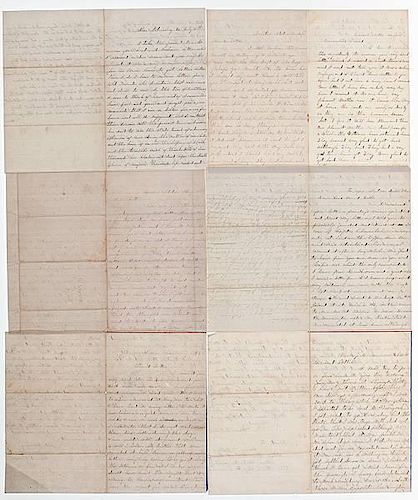Horace G. Babcock, 42nd Pennsylvania Infantry Bucktails, Civil War Archive
About Seller
6270 Este Ave.
Cincinnati , OH 45232
United States
With offices in Cincinnati, Cleveland and Denver, Cowan’s holds over 40 auctions each year, with annual sales exceeding $16M. We reach buyers around the globe, and take pride in our reputation for integrity, customer service and great results. A full-service house, Cowan’s Auctions specializes in Am...Read more
Two ways to bid:
- Leave a max absentee bid and the platform will bid on your behalf up to your maximum bid during the live auction.
- Bid live during the auction and your bids will be submitted real-time to the auctioneer.
Bid Increments
| Price | Bid Increment |
|---|---|
| $0 | $25 |
| $500 | $50 |
| $1,000 | $100 |
| $2,000 | $250 |
| $5,000 | $500 |
| $10,000 | $1,000 |
| $20,000 | $2,500 |
| $50,000 | $5,000 |
| $100,000 | $10,000 |
About Auction
Jun 13, 2014 - Jun 14, 2014
Cowan's Auctions dawnie@cowans.com
- Lot Description
A collection of 13 letters to Leottie L. Leasher, with 12 from Horace Babcock and 1 from Lieut. S.E. Bryants; all handwritten in ink. The letters span the period of September 1861 (?) to July 1864. All are signed and dated. One envelope is included.
Horace Babcock enlisted August 13, 1861 at Harrisburg, PA, as a Private and was mustered into "I" Co. PA 42nd Infantry. At the time of his enlistment, he was a 24-year-old laborer living in Norwich, McLean County, PA.
Babcock re-enlisted on February 1864 and was transferred on May 31, 1864 into "I" Co. PA 190th Infantry. He was captured by confederate forces and imprisoned at Salisbury, NC. He was one of the nearly 12,000 men who died at that facility, succumbing to an unspecified disease on February 20,1865.
The 42nd, also known as the 1st rifles and the 13th reserves, was composed of woodsmen and hunters from different parts of the state, the nucleus being a company from the "Wildcat," district known as the "Bucktails" (derived from the buck tails worn by the men in their hats).
In June 1861, the regiment was mustered into the U. S. service at Harrisburg, for a three year term. They were active in Cumberland, Harper's Ferry, the Shenandoah Valley, Cross Keys, Cedar Mountain, the second Bull Run, South Mountain, Antietam, Fredericksburg and the Gettysburg campaign
In the spring of 1864, the infantry returned to Harrisburg, where they were mustered out June 11, 1864. Remaining veterans and recruits (including Babcock) were transferred to the 190th PA.
Much of Babcock’s early correspondence is about relatively routine matters with concern of “life back home”, and the anticipation of upcoming military action. As time goes on, he talks about his own and his brother’s recoveries and laments the terrible cruelty of the war. He shows his distaste for the disloyalty of Copperheads and talks about his frustrations that the folks back home do not appreciate the difficulties of the struggle. In June of 1863 (shortly before Gettysburg) he makes reference to anxiety amongst the troops as it appears that General Hooker appears to be in motion.
As the War wears on, he is showing the effects of fatigue and war weariness. His writing at times becomes almost poetic. In his last letter he writes of the wounded and dying: …just fancy for a moment you hear one of these sufferers in his fitful moments of slumber as he lisps the Name of Mother. His meandering Mind leads him back to that little cottage by the roadside…he sees the image of his mother as it flits before his imagination and that vacant chair by the fireside where oftentimes he has sat and listened to the sacred teachings of that lovely Being. …He was in the ranks marching on to do battle for his country…he has faced death from the bloody plains of Antietam and corpse strewn heights of Gettysburg and on the gigantic struggle for the capture of Richmond. A little longer and he will know the result. It will end in the downfall of Richmond or the annihilation of our Army.
Unfortunately Babcock was never to know that result.Paper size varies from 5 x 8 in. to 8 x 10 in., five letters being 8 X 10 in. All letters are written on a single sheet but may contain two to four pages (if folded). They are in very good condition.Condition
- Shipping Info
-
SHIPPING. At the request of the buyer, Cowan's will authorize the shipment of purchased items. Shipments usually occur within two weeks after payment has been received. Shipment is generally made via UPS Ground service. Unless buyer gives special instructions, the shipping method shall be at the sole discretion of Cowan's Auctions, Inc.. Cowan's is in no way responsible for the acts or omissions of independent handlers, packers or shippers of purchased items or for any loss, damage or delay from the packing or shipping of any property.
-
- Buyer's Premium



 EUR
EUR CAD
CAD AUD
AUD GBP
GBP MXN
MXN HKD
HKD CNY
CNY MYR
MYR SEK
SEK SGD
SGD CHF
CHF THB
THB




